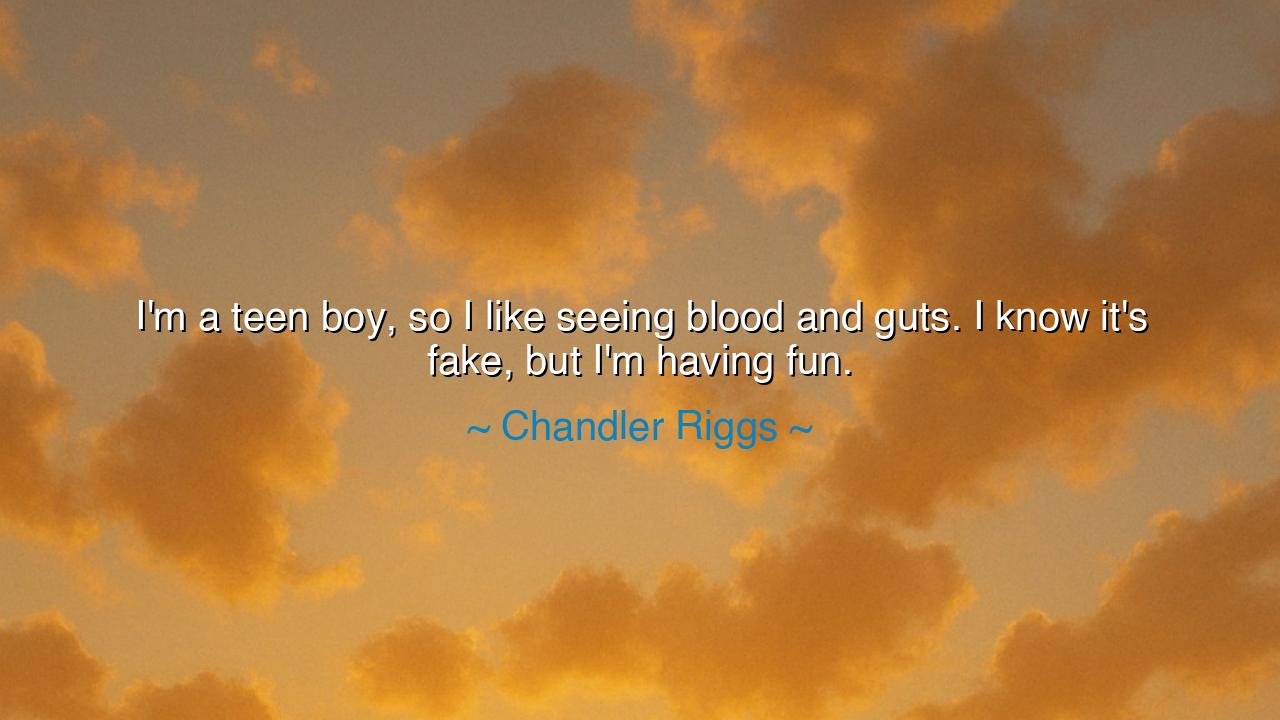
I'm a teen boy, so I like seeing blood and guts. I know it's






Hearken, O children of the ages, to the forthright words of Chandler Riggs, who speaks to the raw and unfiltered passions of teen boys. He confesses a fascination with blood and guts, the visceral spectacles that stir the heart and thrill the imagination. Yet he tempers this admission with the wisdom of perception: he knows it is fake, an illusion crafted for excitement and entertainment. In this reflection, we perceive a timeless truth: the youth are drawn to the intense, the shocking, and the extreme, not solely for cruelty, but for the exhilaration and the rehearsal of courage in a safe and controlled space.
Since antiquity, humans have been drawn to spectacles of violence and danger, for they awaken deep-seated instincts and offer lessons in courage and survival. In the gladiatorial arenas of Rome, youth watched combat with fascination, understanding both the thrill and the peril it represented. The young observer, like Riggs before a screen, experienced the rawness of life and death vicariously, learning boundaries, morality, and emotional resilience through the artifice of performance.
Consider the story of William Shakespeare, who in his plays depicted blood and violence on stage, enthralling audiences with battles, duels, and revenge. Young spectators of his day, like Riggs, felt the thrill of these illusions while understanding their theatrical nature. This duality—engagement with danger, tempered by recognition of its fictional or constructed nature—allowed youth to explore fear, courage, and the complexities of human conflict safely.
Riggs’ reflection illuminates the role of controlled imagination in development. To watch simulated violence is not necessarily an act of indulgence in cruelty; it is an exercise in emotional processing, empathy, and understanding consequences. Teen boys, particularly, are learning to negotiate the intensity of life’s dangers, the exhilaration of risk, and the thrill of confrontation, all within the safe bounds of narrative or performance. This mirrors ancient rites of passage, in which controlled trials prepared the young for the uncertainties of adulthood.
The lesson extends beyond mere entertainment: the engagement with dramatic, shocking, or extreme narratives cultivates attention, empathy, and courage. By confronting the illusion of danger, the teen develops emotional control, discernment, and an appreciation for the consequences of real-life actions. Riggs’ admission underscores a universal principle: human fascination with the intense is natural, provided it is framed within understanding and recognition of reality.
Practical guidance emerges from this reflection. Encourage youth to explore their fascination with intense media with critical awareness. Discuss the difference between fiction and reality, and explore the emotions and questions these narratives provoke. Channel interest in dramatic content into creativity, storytelling, or analysis, allowing intensity to foster insight rather than recklessness.
Riggs’ insight also reminds us of the universality of youthful fascination. Across cultures and centuries, adolescents have been drawn to spectacles, stories of battle, and tales of extremity. From medieval pageants to modern cinema, these experiences serve as safe rehearsals for understanding danger, morality, and courage. The young learn to engage with intensity, process fear, and cultivate excitement while remaining grounded in perception and wisdom.
Thus, heed the eternal teaching of Chandler Riggs: the thrill of blood and guts, when recognized as illusion, is a natural outlet for curiosity, bravery, and emotional growth. By observing, reflecting, and understanding the artifice, youth can explore the extremes of human experience safely, cultivating courage, discernment, and resilience. In this, the passions of adolescence are not mere indulgence—they are vital exercises in the apprenticeship of life, teaching lessons that endure long after the thrill of spectacle has passed.






AAdministratorAdministrator
Welcome, honored guests. Please leave a comment, we will respond soon